Some folks bemoan the loss of the Los Angeles film Festival, claiming that without it, LA no longer has a flagship film festival.
From AFI to Dances with Films, from Method Fest to the TCM Classics Festival that just wrapped, Los Angeles likely has more film festivals of caliber than any other city.
Many of them have been around for decades, hiding in plain sight—mainly at the TCL Chinese Theatres on Hollywood Boulevard. Thing is, on any given week, film fanatics can find showcases of new and classic works across the city.
So, what’s next? The Beverly Hills Film Festival, celebrating its 23rd year and its first-in person festival since the pandemic. The fest held virtual editions from 2020 through 2022.
Festival founder, president and philanthropist Nino Simone, is brimming with excitement for the upcoming event, opening April 19th. He says, “We can’t wait to gather in person once again. Due to the pandemic, recent installments of the festival were virtual, but this year, the BHFF is returning to the red carpet. We are thrilled to get back to the original format and create an immersive experience that fully embodies the spirit of the festival. We look forward to reconnecting the festivalgoers and filmmakers in the heart of the entertainment industry to celebrate the art of film together.”
Simone claims to watch a lot of movies to winnow down selections to the 150 features and shorts unspooling April 19-22 at the TCL Chinese in Hollywood; There are also 150 screenplays vying for the top three spots for the fest’s Screenwriting Awards.
“While the number of screenings scheduled for viewing varies each year,” he says, “I have sat down for a record 20 films in a row. I’ve probably watched over 15,000 films over the last 22 years.”
The festival has estimated audiences in excess of 40,000 for its screenings, and hosts post-screening receptions each night and a gala Awards ceremony at its conclusion on April 23.
While it has a focus on new work by up-and-coming talent, The BHFF has recognized some established filmmakers and hidden gems buried in filmdom’s past. From the first film ever shot in Hollywood–IN OLD CALIFORNIA by D.W. Griffith—to discovering Federico Fellini’s last film VERSO LA LUNA CON FELLINI, BHFF has paid homage to past greats and rising stars.
Last year’s selections included the feature documentary ROGER CORMAN: THE POPE OF POP CINEMA with Ron Howard and Peter Bogdanovich; ROOT LETTER, featuring Mark St. Cyr; THE SANDS BETWEEN with Jessica Chastain and James McAvoy; WE ARE GATHERED HERE TODAY with Danny Huston; NOT TO FORGET, featuring one of Cloris Leachman’s last performances; and THE 90S CLUB with Dick Van Dyke, among others.
From the 150 films screening from the BHFF slate, seven highlights below—mainly documentaries celebrating underrepresented voices—provide a survey of this year’s feature slate to consider. Films are generally presented in blocks consisting of a feature and several shorts, so a favorite may bring some unexpected—but welcome surprises along with it.
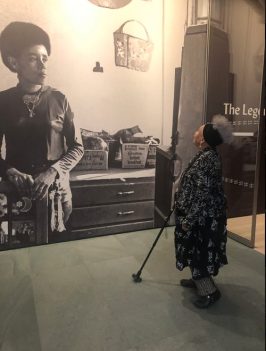 Opening day brings Angela Robinson Witherspoon’s doc feature BETYE SAAR: READY TO BE A WARRIOR. “Make Better Art” is the phrase coined by famed 96-year-old Los Angeles artist Betye Saar, who describes herself as “an ordinary woman who does extraordinary things.” Witherspoon’s film documents Los Angeles-based national treasure Saar, who began her work in the Black Arts Movement of the 1970’s and has always made “good trouble” exploding myths and stereotypes on her journey as creator, teacher, activist, mother and Black woman in America. The film—which has screened at museums and institutions up until now—features John Legend, CCH Pounder, Alison Saar, Lezley Saar, Tracye Saar Cavanaugh, Tony Ramos and Terrell Tilford among others. Still active, look for her work in museums around Los Angeles (her last major museum exhibition was “Call and Response” at LACMA).
Opening day brings Angela Robinson Witherspoon’s doc feature BETYE SAAR: READY TO BE A WARRIOR. “Make Better Art” is the phrase coined by famed 96-year-old Los Angeles artist Betye Saar, who describes herself as “an ordinary woman who does extraordinary things.” Witherspoon’s film documents Los Angeles-based national treasure Saar, who began her work in the Black Arts Movement of the 1970’s and has always made “good trouble” exploding myths and stereotypes on her journey as creator, teacher, activist, mother and Black woman in America. The film—which has screened at museums and institutions up until now—features John Legend, CCH Pounder, Alison Saar, Lezley Saar, Tracye Saar Cavanaugh, Tony Ramos and Terrell Tilford among others. Still active, look for her work in museums around Los Angeles (her last major museum exhibition was “Call and Response” at LACMA).
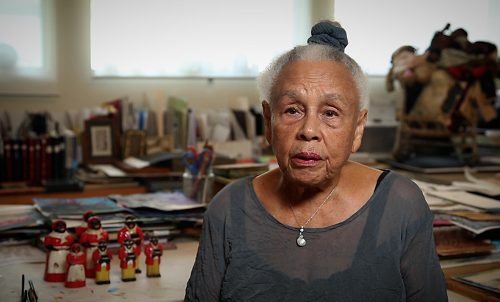
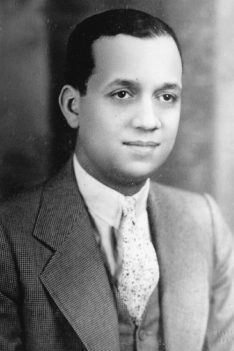
Winner of the 58th Chicago International Film Festival Chicago Award, Harriet Marin Jones’ doc KING OF KINGS: CHASING EDWARD JONES is a deeply personal (she’s the subject’s granddaughter), sweeping look at one of the most powerful and notorious Chicagoans of last century, racketeer Edward Jones. Head of the crime syndicate “Policy” in the 1930s and ’40s, Jones went head-to-head and toe-to toe with Al Capone’s “Outfit” at the same time as he consorted with celebrated artists including Josephine Baker, Frida Kahlo, and Duke Ellington. Ironically, Jones’ rackets comprise the roots of the Illinois State Lottery. The filmmaker says, “Love, glory, violence, exile, success, revenge, mafia, murder, betrayal, prison, kidnapping…Edward Jones’ story holds all the ingredients of the best gangster movies, films noir and great Hollywood frescoes. Add segregation and injustice, and we have a very explosive cocktail!” Produced by and featuring Quincy Jones, screening April 22.
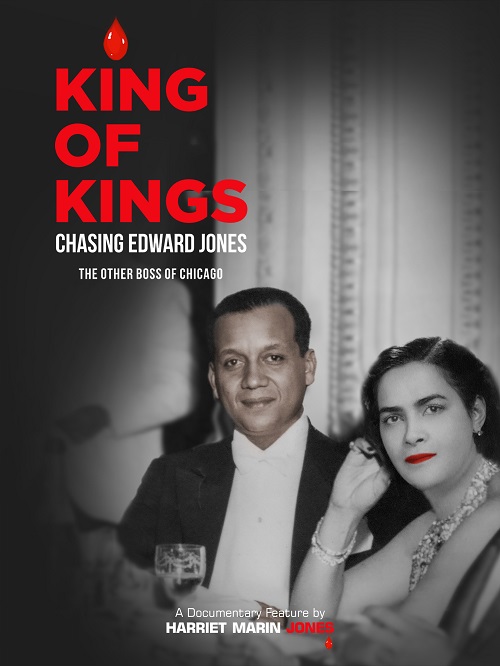
Like her predecessor Alice Guy-Blaché (the subject of Pamela Green’s excellent 2018 documentary BE NATURAL), Dorothy Arzner was a powerful and pioneering film director who history has largely forgotten. She gets her due in Clara & Julia Kuperberg’s short doc DOROTHY ARZNER: PIONEER, QUEER, FEMINIST, playing on the 19th. Starting in the business at age 19 as an editor, Arzner became a director at Paramount as the first woman to direct a talking picture for silent star Clara Bow. A true pioneer of the cinema, she was the only woman director at a major Hollywood studio in the 1930’s and 1940’s, defying convention as openly lesbian, dressing like a man, and making movies “avant-gardiste” about women’s conditions. A mentor of Francis Ford Coppola, who considers her one of the most important woman directors of Hollywood, the film also features Tony Maietta, Shelley Stamp and Emily Carman.
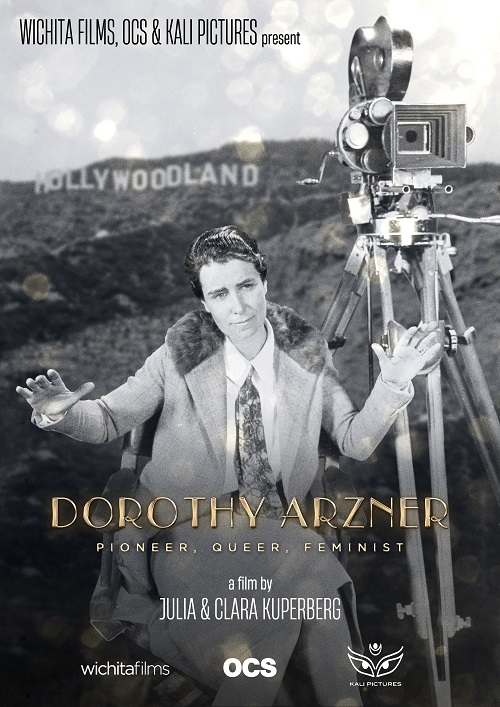
According to the BBC, “Six years ago Alex [Lewis] caught a cold that led to a life-threatening illness…” This is the jumping off point for Simon Ratigan’s ALEX LEWIS: MOUNTAIN. Ratigan says, “Alex Lewis is not someone you easily forget. [Lewis] tells us how Strep A ravaged his body and he survived almost certain death…alive but physically impaired, he lost all his limbs, leaving a self-confessed heavy drinker who was lazy, unadventurous, and a poor father to a three-year-old son to face life as a quadruple amputee.” Turning his life around, Lewis sets off to summit the 15,000-foot peak Ras Dashen in Ethiopia, using a specially adapted vehicle. Reviewer John Higgins says, “ALEX LEWIS: MOUNTAIN is not just a tale of how one man could overcome his own physical limitations, it is also a tale of how diversity and disability can triumph over all manner of challenges thrown your way when curveballs hit you from the centre plate of life.” Playing April 19th.
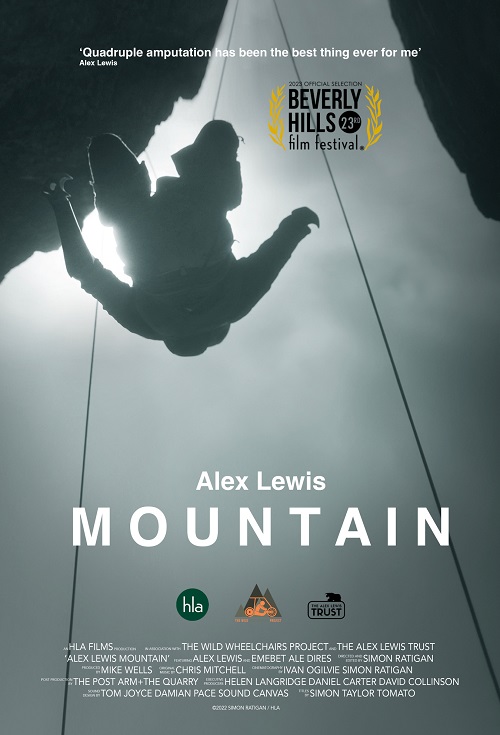
Two festival films examine opposite ends of the Jewish experience—a key demo for the fest as 70% of Beverly Hills residents identify as Jewish. Michael Moshe Dahan’s genre-bending YES REPEAT NO is, according to reviewer Federico Furzan, “a conceptual feature that doesn’t resemble anything you’ve ever seen before. It’s bold, critical, and very, very tense. And it also seems like the only way to address the reality of its subject.” In the film, three actors audition to play the assassinated Palestinian-Jewish actor and activist, Juliano Mer-Khamis, a former IDF paratrooper who defiantly identified as “100% Palestinian and 100% Jewish.” During a VERY tense rehearsal meant to determine which of them is most suited to authentically portray the activist, the three Julianos find their sense-of-self fractured and disrupted. Furzan concludes, “We get glimpses of Mer-Khamis acting in the 1984 film The Little Drummer Girl and the actors follow the orders of a director that implies there’s a code hidden in the actor’s role. This is one of the only connections the film has with reality in its meta story.” YES REPEAT NO rewards careful viewing and plays April 20th.
At the other end of the spectrum lies Matthew Mishory’s philanthropy/water science doc WHO ARE THE MARCUSES? which, which Film Threat called “this year’s great documentary” when it premiered at the Newport Beach Film Festival last fall. It’s since hit first-run festivals like Santa Barbara and Cleveland—as well as screenings at COP 27 and the UN-affiliated World Water Film Festival on its way to BHFF, where it screens Saturday April 22nd. WHO ARE THE MARCUSES? reveals a mysterious and unlikely pair of philanthropists: the unassuming Long Island couple and Holocaust refugees Lottie and Howard Marcus, whose half a billion-dollar gift to Ben-Gurion University in Israel—the single largest charitable donation to the State of Israel in its history—inspired peace and climate action through water technology. No less a personage than Warren Buffet, a featured subject of the doc, called it “a wonderful film recounting the remarkable tale of Israel, water, and philanthropy. I am proud to have played a small part.”
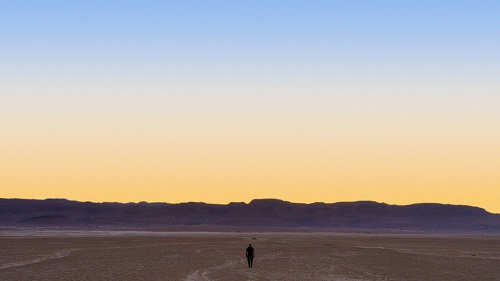
Finally with BARE METAL, a film that has coincidentally trailed WHO ARE THE MARCUSES through the festival circuit, filmmaker Brandon Gries reached out to the MARCUSES camp to point out the serendipity was too close for coincidence. ”BARE METAL is my first film,” he tells them. “I am not a professional filmmaker; I build data centers for a living. Nonetheless, I was inspired to make a film last year and the stars aligned to enable me to realize that long-held dream. I am now trying to drive transformation in green finance between companies at the opposite ends of long value chains to accelerate decarbonization. In addition to not being a professional filmmaker, I do not work professionally in finance; I am an engineer. So, I continue to seek out a lot of expertise.” With the help of co-directors Brandon Freng and Jonathan Shoemaker, Gries’ film details the data center industry’s work to reduce their carbon footprint to lower carbon emissions and help save the world. Gries concludes, “As a returned Peace Corps volunteer, the message of service to others in your film is one close to heart for me.”
The Festival also features panels, parties after each night’s screenings at Hollywood hot spots like Aya, Members and Raspoutine, and concludes on Sunday, April 23rd with a gala black-tie Awards ceremony at the Roosevelt Hotel, featuring honors for festival films, the Golden Palm Award, The Digital Evolution Ace Award, and more.
The Beverly Hills Film Festival: https://beverlyhillsfilmfestival.com.
Tickets range from $20 for individual screening blocks to $550 for the Platinum Pass.